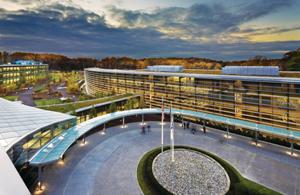Aug 18 2010
Executing on its commitment to sustainability, SAP AG (NYSE: SAP) today announced that the expansion of its North American headquarters on the Newtown Square campus in Pennsylvania has achieved Leadership in Energy and Environmental Design (LEED) Platinum certification, the highest rating given by the U.S. Green Building Council (USGBC). Designed by FXFOWLE Architects and opened in May 2009, the 200,000-square-foot building is currently the largest LEED Platinum-certified facility in the State of Pennsylvania.
Situated adjacent to an existing LEED-certified office on the SAP Newtown Square campus, the four-story building received the maximum number of LEED points in the water efficiency and innovation and design process categories. By using a state-of-the-art water management system, SAP expects to save over one million gallons of water per year. Rainwater is collected in a 50,000-gallon cistern that supplies water for landscape irrigation and the flushing of toilets in some of the building's bathrooms. Low-flow bathroom fixtures help further reduce the water usage of the company's nearly 2,000 Philadelphia-area employees and the approximate 3,000 annual visitors.
"When we laid the foundation for the new SAP building in Pennsylvania, our goal was to create an inspirational work place for our Philadelphia-area employees and show our commitment to sustainable development and growth in North America," said Bill McDermott, co-CEO of SAP AG. "We are also a company that lives and breathes innovation for our customers — in how they run their businesses, achieve their sustainability goals, power their business networks and empower their employees. The SAP office building in Newtown Square is among the pioneers in green building design worldwide. This is one of the ways that we role model the strategies that we believe in."
Energy-Efficient Buildings are Part of SAP's Sustainability Strategy
Energy-efficient buildings support SAP's global efforts to lower the company's total carbon emissions to the level of 2000 by the year 2020. This represents an overall reduction of 50 percent compared to the peak year 2007. SAP estimates that the new building is one-third more energy-efficient compared to conventional buildings by using intelligent design features. The building's sensor system is integrated with exterior shading devices that automatically adjust the lighting and help control the temperature level in the facility. A hybrid air conditioning system produces ice to cool the building during the overnight hours when energy demands and electric rates are the lowest. Floor-to-ceiling glass exteriors and a green roof, planted with native and regional vegetation, integrate the office with its surrounding natural environment and create an exceptional work environment.
 SAP- North American headquarters
SAP- North American headquarters
In addition, SAP committed to an annual purchase of 19 million kilowatt-hours of wind-generated Renewable Energy Certificates (RECs). The wind-energy purchase offsets more than 80 percent of the electricity needs of the SAP Newtown Square campus and reduces the company's carbon footprint by over 10 tonnes.
Building is a Milestone in Global Commitment to Sustainability
SAP is executing on its strategic focus on sustainability, which includes both a commitment to managing its internal operations in a more sustainable way and delivering solutions that support improved sustainable business practices of their customers. As reported in SAP's sustainability report and the sustainability update for the second quarter of this year, the company has put measures in place to help reduce its greenhouse gas emissions (GHG) by focusing on key areas, including buildings and facilities.
Worldwide, SAP aims for a minimum of LEED Silver standard for new buildings that are owned by the company. In addition to the facility in Newtown Square, SAP recently constructed a LEED Gold-certified SAP building in Sao Leopoldo, Brazil. Its newly opened facility in St. Ingbert, Germany, is seeking LEED Gold certification. Developed by USGBC, the internationally recognized green building certification system LEED provides third-party verification that a building was built using strategies aimed at improving performance across a key set of metrics, including energy savings, water efficiency, CO2 emissions reduction, improved indoor environmental quality, as well as stewardship of resources and sensitivity to their impacts.
In 2009, SAP also completed more than 100 projects to improve energy efficiencies in existing facilities by retrofitting buildings with energy savings technology, such as motion detectors, timer-controlled lighting and improved cooling and heating systems. The company regularly conducts awareness campaigns to show employees how to protect natural resources and achieve energy savings in their day-to-day office work. SAP also created an electricity tracker that measures the electricity consumption of more than 40 SAP buildings on a month-by-month basis. Employees can monitor SAP's progress in achieving the overall carbon reduction goal.
The SAP headquarters expansion in North America has received several prestigious design awards, including the Award of Merit from the American Institute of Architects New York State Chapter and the International Architecture Award from The Chicago Athenaeum. The public-interest organization Citizens for Pennsylvania's Future (PennFuture) recognized SAP AG with a "Green Power" award honoring the sustainable practices followed by SAP for the construction of its newest addition to the Newtown Square campus.
Source: http://www.sap.com/